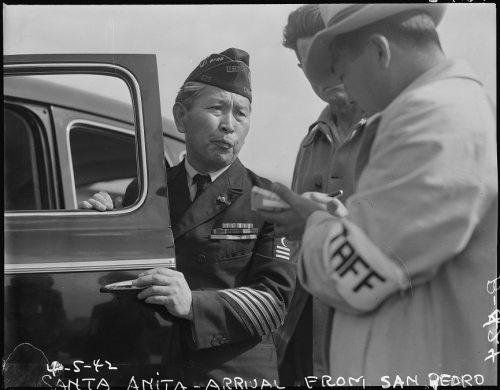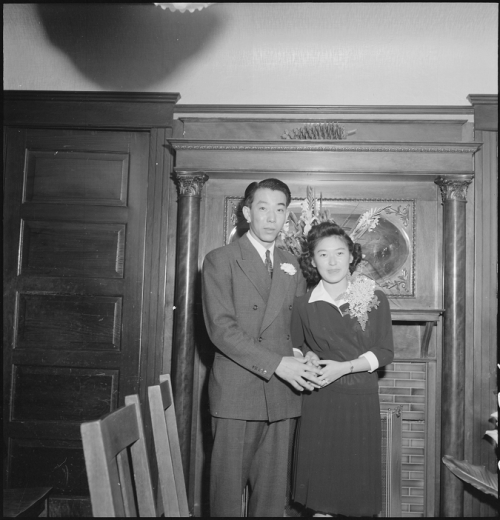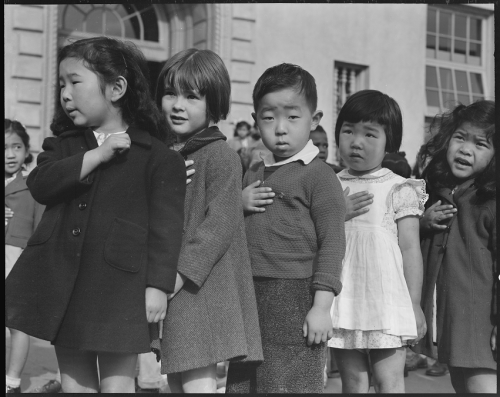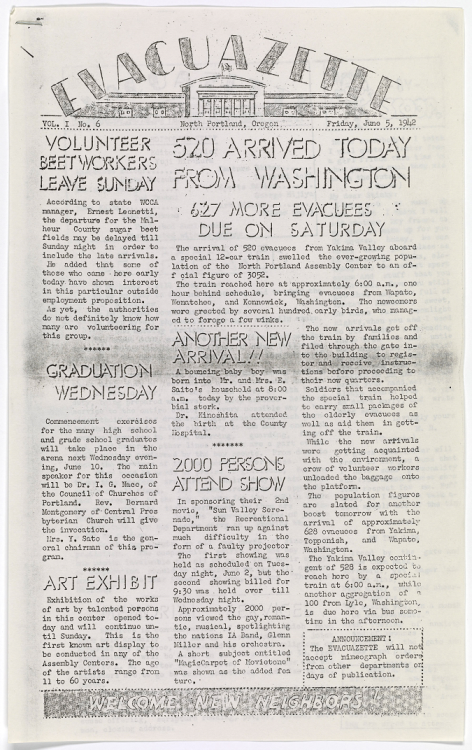#japanese american history
Men in Los Angeles’ Little Tokyo read bulletins with instructions on their impending removal to incarceration camps, 4/11/1942.
Series: Central Photographic File of the War Relocation Authority, 1942 - 1945
Record Group 210: Records of the War Relocation Authority, 1941 - 1989
Image description: Men stand on a sidewalk and read a sign posted in an empty shop window. The sign is in Japanese.
Post link
Wearing his WWI U.S. Navy uniform, a man of Japanese descent arrives at Santa Anita Assembly Center after being forced to leave his home on the West Coast, 4/5/1942.
Series: Central Photographic File of the War Relocation Authority, 1942 - 1945
Record Group 210: Records of the War Relocation Authority, 1941 - 1989
Image description: A gray-haired man in a WWI US Navy dress uniform holds the open door of a car. Another man wearing a trenchcoat and an armband reading STAFF writes on a notepad.
Post link
Barracks at a temporary “Assembly Center” as people await transfer to an incarceration camp on 3/31/1942. About 120,000 people of Japanese descent were removed from their homes during WWII.
Series: Central Photographic File of the War Relocation Authority, 1942 - 1945
Record Group 210: Records of the War Relocation Authority, 1941 - 1989
Image description: A man sits on a bed in a building with wooden plank walls. Shelves hold some personal belongings such as books, shaving equipment, and a photo. Two other beds, some folding camp stools, and a table are also visible. A piece of fabric is nailed up in front of the window.
Post link
George and Michiko Uchida were married, 4/27/1942.
Two days later, they were taken to an incarceration camp for people of Japanese ancestry.
About two-thirds of the Japanese Americans incarcerated during WWII were American citizens.
Series: Central Photographic File of the War Relocation Authority, 1942 - 1945
Record Group 210: Records of the War Relocation Authority, 1941 - 1989
Image description: George and Michiko Uchida stand in front of a flower arrangement, holding hands. He is wearing a suit with a carnation in the lapel buttonhole; she is wearing a medium-dark dress with white collar and cuffs, and a large corsage of lilacs.
Post link
First-graders recite the Pledge of Allegiance at their school in San Francisco. People of Japanese ancestry, including children, would soon be removed from their homes on the West Coast and sent to incarceration camps. 4/20/1942.
Series: Central Photographic File of the War Relocation Authority, 1942 - 1945
Record Group 210: Records of the War Relocation Authority, 1941 - 1989
Image description: Children, some of Asian descent and some of European descent, stand in a line and hold their right hands over their hearts. One little boy is looking directly at the camera.
Post link
Japanese Americans incarcerated at the Portland Assembly Center published this newsletter, 6/5/1942. The Evacuazette documents life in the converted livestock exposition center.
File Unit: Unsolicited Testimony J, 1981 - 1982
Series: Unsolicited Testimony Files, 1981 - 1982
Record Group 220: Records of Temporary Committees, Commissions, and Boards, 1893 - 2008
Transcription:
Post link

“This volume presents an intimate view of Japanese American incarceration in the South. It is a vital resource, preserving the voices and personal stories of the Imahara family and others who survived injustice at Rohwer and Jerome.”

“Buxton’s achievement lies in placing human lives dead center of an accounting of Nisei in Japan during the transwar period. Those lives include not only the infamous (e.g. “Tokyo Rose” figure as persons and symbol), but also the everyday workers who, though born and sometimes raised in the United States, proudly called Japan “home.” Loyalty lies at the core of these Nisei lives, guiding their actions and affiliations. What Buxton makes clear is that this loyalty was neither blood-based nor blind, but instead negotiated, situational, and complexly drawn.”
The JACL is looking to create a Next Gen Speakers Program for volunteers who can speak on a variety of subjects related to the Japanese American experience, history, and culture. We want these speakers to be able to engage with a wide audience to learn about our community and history from someone who knows it well. Types of speaker engagements could include classroom lessons, Day of Remembrance celebrations, news interviews, research projects, and more!
Program Expectations:
Program training will consist of multiple sessions over Zoom in which participants will be given opportunities to refine their stories, practice with others, hear from other speakers, and get material that they can share as part of their engagements. These trainings will take place over several months, 1-2 times per month. Regular attendance is expected but all sessions will be recorded in case of absence or for later use. Speaking responsibilities will be on a case by case basis, as needed or requested.
Some possible events to look forward to as a speaker: Invitations to speak at JACL NEH 2022 Summer Program, special speakers group reception at 2022 National Convention, participation in JACL National Education Committee Teacher Training Workshops, and more!
Eligibility:
Anyone is welcome to join, you don’t need to be Japanese or Japanese American, or have any family connection to the incarceration. We also welcome anyone who isn’t looking to be a speaker but wants to learn more about Japanese American history or use this knowledge of the incarceration experience in other ways such as through art and media. The goal of the program is to increase historical knowledge amongst the community and to possibly help people find out more of their personal family history.







